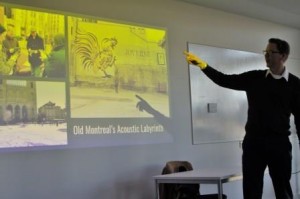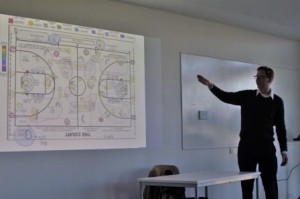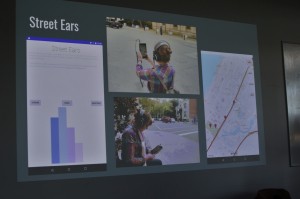
Rebecca McGuire-Snieckus
Concordia’s Eric Powell explores sound based mapping
Posted on February 2, 2018
Concordia’s PhD candidate Eric Powell delivered a fascinating talk at Bath Spa University hosted by James Saunders who leads Open Scores Lab and Kate Rigby who leads the Environmental Humanities Research Centre. The talk, titled Hearing motion in the moment: New forms of interactive sound based mapping explored themes of acoustic ecology, sound waves and field recording.  Powell discussed the inherent difficulty of talking about sound. Beyond the challenge of sharing the individual experience of listening, ‘Sound is ephemeral. You can’t linger or dwell on sound like you can an image. The processual nature of listening confronts the individual to work through their relationship to the lived environment. Sounds are fleeting and evolving so listening needs to be flexible.’
Powell discussed the inherent difficulty of talking about sound. Beyond the challenge of sharing the individual experience of listening, ‘Sound is ephemeral. You can’t linger or dwell on sound like you can an image. The processual nature of listening confronts the individual to work through their relationship to the lived environment. Sounds are fleeting and evolving so listening needs to be flexible.’  Street Ears (funded by the SSHRC) examines the interrelationships among space, place, and aural environments with a focus on creating interactive sound-based mappings, and digital interfaces that challenge the ways in which we hear the sounds of the world around us.
Street Ears (funded by the SSHRC) examines the interrelationships among space, place, and aural environments with a focus on creating interactive sound-based mappings, and digital interfaces that challenge the ways in which we hear the sounds of the world around us.  Rules of a Sound Walk (you don’t have to walk: you can sit or lie down and do this exercise too): 1. You can do a sound walk alone, or in a group, but you need to agree to not talk (unless it is absolutely necessary, for instance, ‘if your companion is about to fall into a hole’). 2. Dedicate your attention to listening. Listen for the nearest sound. Then listen for the furthest sound. Give yourself a minimum of 30 minutes for dedicated listening, but ideally one hour. ‘After 30 minutes the listening typically ‘clicks’. Ideally you will give yourself 30 seconds to listen for the furthest sound, then 30 minutes to bring your listening back into focus. Eric Powell can be contacted here: egpowell@gmail.com
Rules of a Sound Walk (you don’t have to walk: you can sit or lie down and do this exercise too): 1. You can do a sound walk alone, or in a group, but you need to agree to not talk (unless it is absolutely necessary, for instance, ‘if your companion is about to fall into a hole’). 2. Dedicate your attention to listening. Listen for the nearest sound. Then listen for the furthest sound. Give yourself a minimum of 30 minutes for dedicated listening, but ideally one hour. ‘After 30 minutes the listening typically ‘clicks’. Ideally you will give yourself 30 seconds to listen for the furthest sound, then 30 minutes to bring your listening back into focus. Eric Powell can be contacted here: egpowell@gmail.com


Responses